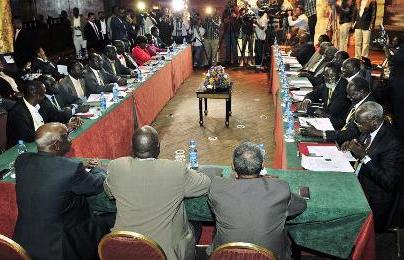South Sudan rebels accuse IGAD of “confusing” the peace process
August 14, 2015 (ADDIS ABABA) – South Sudan’s armed opposition faction under the leadership of the country’s former vice president, Riek Machar, has accused the East African regional bloc, the Intergovernmental Authority on Development (IGAD), of further “confusing” the whole peace process in Addis Ababa, saying a peace deal may not be reached as planned.

Dak revealed that a so-called ‘front-line states’ in their recent meeting in Uganda this week came up yet with amendments to their own ‘peace compromise proposal’ in which they changed provisions in the draft agreement.
The group calling itself the “Front-line States” composed of Uganda, Kenya, Ethiopia and Sudan were invited for a meeting to Entebbe, Uganda, by president Yoweri Museveni.
Ethiopian prime minister, Hailemariam Desalegn and Kenyan president Uhuru Kenyatta, joined by the Sudanese foreign minister Gandour, held the Monday joint meeting during which president Museveni criticized the IGAD-Plus proposal as coming from the “White man” and was seeking for an African solution.
President Museveni and president Salva Kiir of South Sudan reportedly asked for changes to be made in the proposal as well as for the 17 August deadline to be extended to give the two warring parties ample time for direct negotiations.
However, the rebel leader’s press secretary said information the armed opposition has received from the IGAD chief mediator, Seyoum Mesfin, indicated that major unilateral changes surprisingly took place in the IGAD-Plus proposal.
“While the warring parties have been negotiating to try to agree on some of the contentious issues that can now be incorporated into the IGAD-Plus peace proposal as amendments, IGAD-without-Plus has stepped back by changing provisions and coming up yet with new proposals in the text,” Dak further lamented.
For instance, he said, the “front-line states’ were dragged by president Museveni into withdrawing the provision for power-sharing in the states. The IGAD-Plus proposal initially said in the three states of Unity, Upper Nile and Jonglei states in the greater Upper Nile region, the government would get 33%, the Sudan Peoples’ Liberation Movement (SPLM-IO) would get 53% and the former detainees and political parties would equally share the remaining 14%.
“This time IGAD is saying there should be no power sharing in the states,” he said.
He said IGAD in the Uganda meeting had also reneged on its previous proposal which sought for demilitarization of the capital, Juba. The opposition supported the demilitarization of the capital, including state capitals and other major towns in the country, arguing that it would restore confidence and avoid repeat of massacres of civilians in the towns by the army.
Dak further added that on the security arrangements including command of the rival armies for a period of transition, unification and duration of the process, the front-line states said the issue would be left to army chief of staffs of Ethiopia, Kenya, Sudan and Uganda.
He said the latest development has gone against the very peace proposal by IGAD-Plus which was supposed to be the basis for negotiations and agreement.
He said the armed opposition faction of the SPLM-IO will not accept this, criticizing IGAD for dwelling on conflicting interests among the regional actors instead of focusing on a consistent sustainable path to peace in South Sudan.
“It is better to call off the August 17 deadline because it would be a meaningless exercise,” he said.
(ST)
